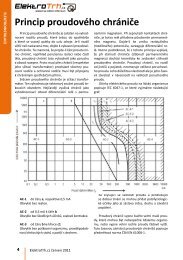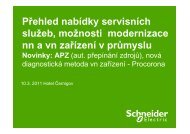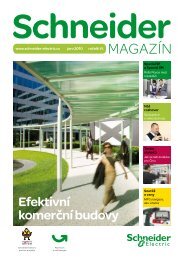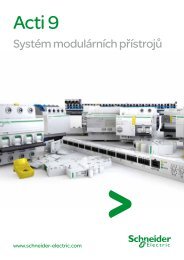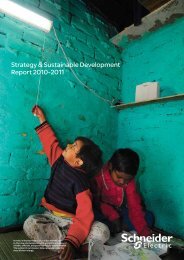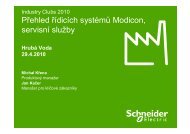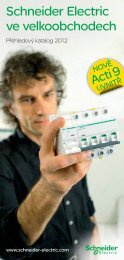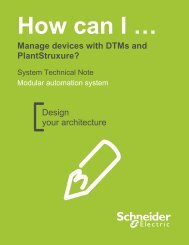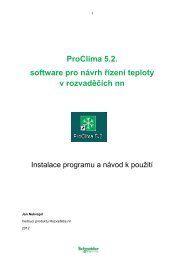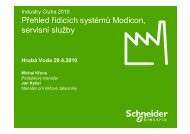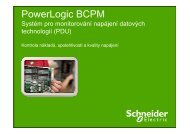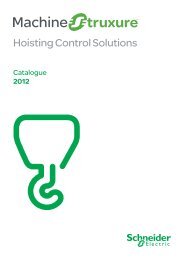2010Annual Report - Schneider Electric CZ, s.r.o.
2010Annual Report - Schneider Electric CZ, s.r.o.
2010Annual Report - Schneider Electric CZ, s.r.o.
Create successful ePaper yourself
Turn your PDF publications into a flip-book with our unique Google optimized e-Paper software.
5 CONSOLIDATED FINANCIAL STATEMENTS<br />
NOTES TO THE CONSOLIDATED FINANCIAL STATEMENTS<br />
158<br />
Note 1 Accounting Policies<br />
1.1 - Accounting standards<br />
The consolidated financial statements have been prepared in<br />
compliance with the international accounting standards (IFRS) as<br />
adopted by the European Union as of December 31, 2010. The<br />
same accounting methods were used as for the consolidated<br />
fi nancial statements for the year ended December 31, 2009, with<br />
the exception, notably, of the fi rst application of the revised IFRS 3<br />
- Business Combinations and revised IAS 27 – Consolidated and<br />
Seperate Financial Statements norms<br />
IAS 27 (revised) presents the consolidated fi nancial statements of a<br />
group as those of a single economic entity with two categories of<br />
owners: fi rstly the equity holders of the parent (<strong>Schneider</strong> <strong>Electric</strong><br />
SA shareholders) and secondly non-controlling interests (minority<br />
shareholders in the subsidiaries). A non-controlling interest is defi ned<br />
as the equity in a subsidiary not attributable, directly or indirectly, to<br />
a parent (hereinafter “minority interests”). Under this new approach,<br />
changes in a parent’s ownership interest in a subsidiary not resulting<br />
in a loss of control are accounted for as equity transactions since<br />
there is no change in control within the economic entity. Thus, from<br />
January 1, 2010, when increasing its interest in a consolidated<br />
subsidiary, the Group recognises the difference between the<br />
acquisition cost and the book value of the minority interests as a<br />
change in equity attributable to the shareholders of <strong>Schneider</strong> <strong>Electric</strong><br />
SA. Conversely, the Group recognises any gains or losses generated<br />
on share sales resulting in a loss of control of the subsidiary in the<br />
statement of income.<br />
IFRS 3 (revised) introduced a series of changes to the acquisition<br />
method as defi ned in IFRS 3 prior to the revision, notably including:<br />
• the option to measure the minority interests in the acquiree either<br />
as their proportionate interest in the identifi able net assets of the<br />
acquiree or at fair value. This option is available on a case by case<br />
basis for each acquisition;<br />
• the recognition of any adjustment to the purchase price at fair<br />
value from the acquisition date;<br />
• the recognition as an expense for the period of costs directly<br />
associated with the acquisition;<br />
• in the case of a business combination achieved in stages (step<br />
acquisition), the fair value measurement on the acquisition date of<br />
the interest previously held in the acquiree and the recognition of<br />
any resulting gain or loss in the statement of income.<br />
The impact on the statement of income of the application of IFRS 3<br />
(revised) and IAS 27 (revised) is recognised under other operating<br />
income/(expense). EUR31 million in acquisition-related costs were<br />
recognised in the statement of income in 2010.<br />
The main areas of impact of the adoption of IFRS 3 (revised) and<br />
IAS 27 (revised) on <strong>Schneider</strong> <strong>Electric</strong>’s consolidated financial<br />
statements as of December 31, 2010 were as follows:<br />
• the treatment of the sale of shares in <strong>Schneider</strong> <strong>Electric</strong> South<br />
Africa without a loss of control, recognised in equity and thus<br />
not resulting in any gain on disposal being recognised in the<br />
statement of income;<br />
• the restatement in the 2009 comparative statement of income<br />
of the EUR25.8 million in acquisition costs incurred in 2009 on<br />
deals concluded in 2010; these costs were previously capitalised<br />
whereas they must be recognised as an expense for the period<br />
under the new standard (see below: reconciliation between the<br />
published 2009 statement of income and balance sheet as of<br />
December 31, 2009 and those presented for comparative<br />
purposes).<br />
2010 REGISTRATION DOCUMENT SCHNEIDER ELECTRIC<br />
The following standards and interpretations that were applicable<br />
during the period did not have a material impact on the consolidated<br />
fi nancial statements as of December 31, 2010:<br />
• amendment to IFRS 1 – First-time Adoption of International<br />
Financial <strong>Report</strong>ing Standards;<br />
• amendment to IFRS 2 – Share-based Payment (Group cashsettled<br />
share-based payment transactions);<br />
• amendement of IAS 39 – Financial instruments: Recognition and<br />
Measurement – Exposures Qualifying for Hedge Accounting;<br />
• IFRS improvements (May 2008): amendment to IFRS 5;<br />
• IFRS improvements (April 2009);<br />
• IFRIC 12 – Service Concession Arrangements;<br />
• IFRIC 15 – Agreements for the Construction of Real Estate;<br />
• IFRIC 16 – Hedges of a Net Investment in a Foreign Operation;<br />
• IFRIC 17 – Distributions of Non-cash Assets to Owners;<br />
• IFRIC 18 – Transfers of Assets from Customers.<br />
There are no differences in practice between the standards applied<br />
by <strong>Schneider</strong> <strong>Electric</strong> as of December 31, 2010 and the IFRSs issued<br />
by the International Accounting Standards Board (IASB), since the<br />
application of standards and interpretations that are mandatory for<br />
reporting periods beginning on or after January 1, 2010 but not yet<br />
adopted by the European Union would not have a material impact.<br />
Lastly, the Group did not apply the following standards and<br />
interpretations that had not yet been adopted by the European<br />
Union as of December 31, 2010 or that are mandatory at some<br />
point subsequent to December 31, 2010:<br />
• standards adopted:<br />
– IAS 24 – Related party disclosures,<br />
– amendment to IAS 32 – Classifi cation of rights issues,<br />
– amendment to IFRIC 14 – Prepayments of a Minimum Funding<br />
Requirement,<br />
– IFRIC 19 - Extinguishing Financial Liabilities with Equity<br />
Instruments;<br />
• standards not yet adopted:<br />
– improvements to IFRSs (May 2010),<br />
– IFRS 9 - Financial Instruments,<br />
– amendment to IFRS 7 – Disclosures – Transfers of fi nancial<br />
assets,<br />
– amendments to IFRS 1 – Severe Hyperinfl ation and Removal<br />
of Fixed Dates for First-time Adopters,<br />
– amendments to IAS 12 – Deferred Tax: Recovery of Underlying<br />
Assets.<br />
<strong>Schneider</strong> <strong>Electric</strong> is currently assessing their potential impact on<br />
the Group’s consolidated financial statements. At this stage of<br />
analysis, the Group does not expect the impact on its consolidated<br />
fi nancial statements to be material, except for IFRS 9 for which an<br />
impact analysis has not yet begun, due to its incomplete nature and<br />
uncertainties surrounding the adoption process in Europe.<br />
The fi nancial statements provide data prepared in accordance with<br />
IFRS for the years ended December 31, 2010 and December 31,<br />
2009. The fi nancial statements for the year ended December 31,<br />
2008, presented in the Registration Document registered with<br />
Autorité des Marchés Financiers (AMF) under number D 09-0124<br />
on March 17, 2009, are incorporated by reference.




